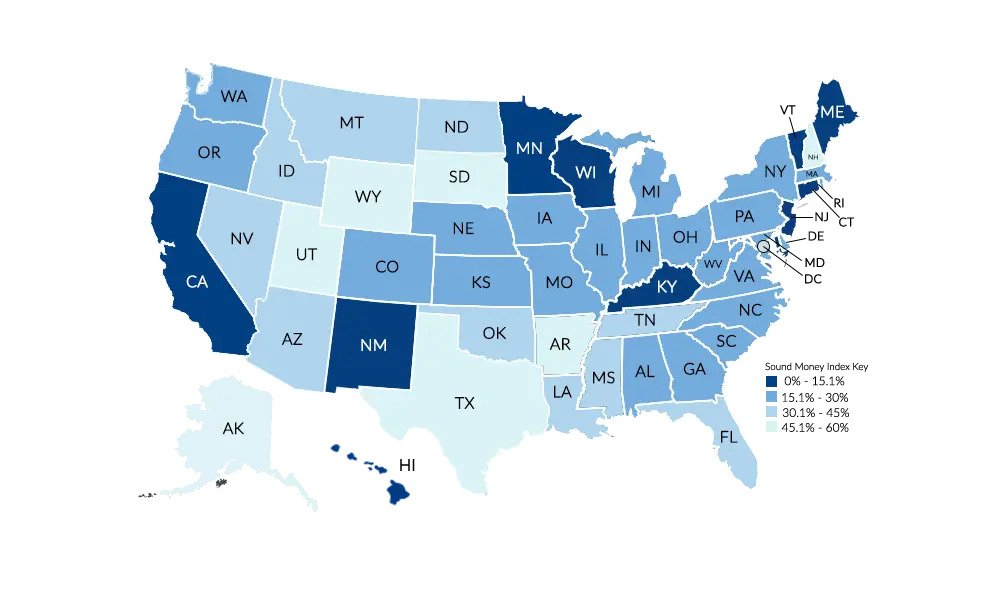
With inflation, debt, and financial instability continuing to make headlines, a new national scorecard exposes Vermont, New Jersey, Maine, and Minnesota as America’s absolute worst states for sound money...
...while Wyoming, South Dakota, Alaska, and New Hampshire came out on top in the rankings.
Money Metals Exchange, the top-rated precious metals dealer and depository in the United States, has partnered with the Sound Money Defense League to create the 2024 Sound Money Index, ranking all 50 states based on their policies in this increasingly important public policy area.
The Index's scoring system evaluates state laws such as sales and income tax policies concerning precious metals, whether a state affirms the role of gold and silver under the U.S. Constitution, the existence of gold or silver in state pension funds or reserves, the existence of regulations that harm or otherwise punish precious metal dealers and investors, and other relevant issues.
Notable changes on the 2024 Sound Money Index since last year include Arkansas’s meteoric ascent from 30th to 5th place as well as Mississippi’s leap from 43rd to 16th place.
Building on momentum from 2021’s precious metals sales tax repeal, Arkansas Gov. Hutchinson signed a sound money bill to end all income tax liability on the monetary metals, while also reaffirming gold and silver as legal tender and prescribing that state courts should require specific performance when enforcing contracts denominated in gold and silver.
After a multi-year legislative effort, Mississippi lawmakers canceled all sales taxes on precious metals. The Magnolia State became the 43rd state in the country to remove taxes on purchases of gold and silver.
Meanwhile, Florida passed legislation in 2023 to roll back its harassment laws targeting precious metals dealers, and Tennessee enacted legislation empowering its state treasurer to protect taxpayer reserves with a modest allocation to physical gold and silver.
This year’s Index includes a new, 14th criterion: Gross Revenue Tax. Such taxes are levied against total sales of companies in a handful of states. A gross receipts tax is a percentage of the topline revenue received by a business, and it ignores whether a business category has a high or low gross profit margins.
A gross revenue tax on precious metals businesses is extremely burdensome when compared to other types of businesses.
That’s because precious metals dealers operate on extremely small gross profit margins — margins that are similar in scale to those on transactions involving real property, investments, or other goods sold by brokerages, which are usually exempt from state gross revenue tax schemes in the first place.
Oregon passed legislation in 2023 joining the vast majority of states that have exempted precious metals dealers from gross receipts tax or which don’t impose this tax at all. However, Ohio, Tennessee, Texas, and Delaware all lost points on the 2024 Sound Money Index for their controversial gross revenue tax regimes.
"As inflation eats away at American families, the Sound Money Index holds states accountable for their policies impacting sound money, explained Jp Cortez, Executive Director of the Sound Money Defense League.
“In response to this pressing issue, forward-thinking policymakers in half the states across the U.S., including the five that successfully passed bills, proposed legislation in 2023 that promoted and protected the use, sale, and purchase of gold and silver in their respective states.”
The complete 2024 Sound Money Index is available here.
